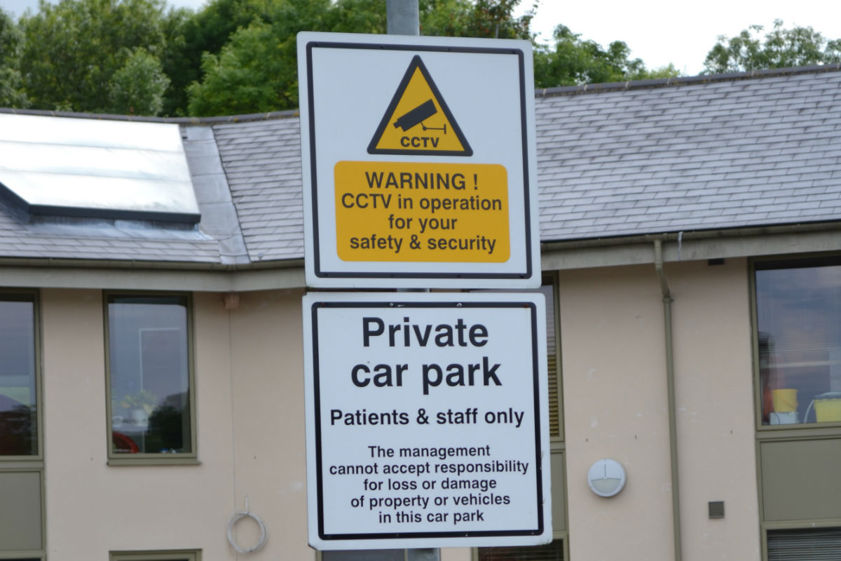
Parking can be like wandering into the Wild West. Drive into your local supermarket car park, and the chances are as soon as you’ve crossed the threshold from public highway to private car park, you’re being watched.
The same goes for parking in motorway service stations, hospitals, airports and residential developments. You might be parked legitimately, but put a foot wrong, and the reward is a malevolent yellow pouch decorating your windscreen.
What do you do if you’ve been landed with one? There are two options: roll over and pay, or fight.
If you’re in the latter camp, take heart – thousands of people have launched successful appeals against private parking companies (‘PPCs’) and won. As one of the UK's largest car leasing brokers, we often hear from confused customers about how to handle unfair parking fines, so here's a few tips on how you can take control.
We talk about:

1. Penalty Charge Notice or parking invoice? Check first.
There’s a totally different set of rules for appealing parking fines issued by public bodies such as the Police or local councils – so check who issued the ticket.
PPCs usually issue ‘parking charge notices’ (‘PCNs’) which sound very similar to the penalty charge notices issued by local authorities. It’s no accident that they also look confusingly similar – but the law governing private parking is contract, as opposed to criminal law.
PPCs have no power to issue fines – they hand out invoices dressed up to look like fines. Don’t be fooled.

2. Ignore it?
This approach seems quite appealing. Picture the scene – it’s Saturday morning – would you prefer: a) a well-earned lie-in; or b) putting finger to keyboard to research appeal strategies to get the PPC off your back?
The old school of thought would be to simply file the PPC’s demands for payment in the bin and avoid engaging them in correspondence.
These days, the registered keeper of a vehicle can be held liable for parking charges incurred on private land, so hoping it’ll just go away may not be a recipe for relaxation.

3. Driver or registered keeper?
Note that if you’re not the driver who parked the car but are the registered keeper, the PPC can pursue you but must have served you with a ‘Notice to Keeper’ requesting the driver’s details. You are under no legal obligation to provide them, but you can be pursued for payment if you don’t.
However, the PPC must comply with specific procedural steps in order to legitimately attempt recovery of any charges from the registered keeper. If they fail to do so, the registered keeper can decline to provide the driver’s details without further liability.

4. Appeal to the retailer or landowner
Got carried away browsing for drill bits in B&Q and lost track of time? If so, you’re not a parking nuisance; you’re a legitimate customer (please note that other DIY stores are available). Being rewarded for your custom with a hefty fine is somewhat galling.
The common sense approach dictates any business worth their salt is unlikely to sanction militant parking enforcement on their turf.
Likewise, if you stopped at a motorway service for a 20-minute power nap, which turned into a 3-hour snooze – appeal to the company operating the service area. Tiredness can kill, but taking a nap for safety reasons shouldn’t cost anything.

5. Go through the official appeals process
If your unfair parking invoice was issued by a BPA approved operator (see list here) there will be an independent appeals process. This means that if you appeal to the PPC and they reject it, they are obliged to provide you with information on how you can appeal via POPLA (Parking On Private Land Appeals).
They should also provide you with a verification code that identifies your case. You’ll normally have 28 days from receiving the PPC’s rejection letter to make a POPLA appeal.

6. Check the signage
Car parks operated by PPCs typically have signs placed all over the place, setting out their ‘terms and conditions’. By parking, you effectively sign up to a contract and agree to their terms and conditions – the breach of which (by, for example, failing to display a valid permit) leads to the issue of a charge.
The signage is not infallible, though. Check that any signs are legible from where you parked, and if it was dark, check whether they were lit. The name of the company issuing the PCN should also be displayed, and signs should be written in understandable English.
If the signage doesn’t comply, there may be no valid contract and no grounds for the charge.

7. Notice to keeper? Check they have obtained your details lawfully
Only PPCs belonging to an Accredited Trade Association (ATA) body, such as the BPA or the Independent Parking Committee (IPC), can lawfully obtain the registered keeper’s details from the DVLA.
If the PCN comes from a company not registered with an ATA body then you may have grounds to complain to the DVLA and seek cancellation of the ticket.

8. If it's unfair, hold your ground
If you're convinced the ticket has been issued unfairly, don’t let the PPC bully you. Dig your heels in and be prepared for some hard work.
A PPC may well instruct debt recovery agents, but they have no power to force you to pay the charge without going to court and certainly cannot damage your credit rating.

9. What if the worst happens?
If you are taken to court and they win? Don’t panic – such matters normally go through the Small Claims track. Your liability should be limited to the original penalty charge amount – usually £60 or £80, depending on the operator – there is no power to award costs.

10. Research
It might take a bit of time commitment but it’s worth doing some research if you’ve received an unfair parking charge – there is a wealth of useful information on the internet.
Remember none of this constitutes legal advice – if you do receive court papers you may want to seek professional legal advice appropriate to your circumstances.
“We always advise our customers to check the evidence carefully, especially for fines from private operators, where there’s often room to challenge.”

If you drive a lease vehicle, dealing with a private parking fine works a little different.
Unlike a car you own outright, your finance provider is the registered owner of the vehicle. This means that the parking charge notice is usually sent directly to them first.
This can cause a delay in you receiving the fine, and in some cases, it may be paid and recharged to you before you've had the chance to contest.
We'd recommend:
- Checking the date on the fine to ensure it's correct
- Request a copy of the original notice if you're planning to appeal
- Gather your own evidence, just like you would if the fine came directly to you
At Nationwide, our team regularly supports customers who receive parking tickets. Get in touch with our customer services team, and we'll be happy to help.
- Fine sent to lease company
- Leasing provider/broker forwards the fine to you (this may take a few days)
- Check if the leasing company has already paid it (and invoiced you)
- If not paid, assess the fine and gather appeal evidence
- Contact your lease provider to clarify your appeal rights
- Appeal the fine (if you think its unfair)
- Track your appeal and follow it up
Although we're in the age of technology, not all parking fines arrive in the post. Sometimes, you'll return to your car and there's a ticket slapped on the windscreen. Yes, it's frustrating and yes it might ruin your day (been there), but you'll still need to deal with it.
- Don't ignore it, it will only make matters worse
- Take photos - Snap the sign, your car's position, and anything else that may help your case.
- Check who issued the fine - Is it a council charge or a private company fine?
- Keep the ticket - Don't throw it away out of petulance. You'll need the reference number and any details provided.
If you've got a parking ticket while driving a lease car and you don't think it's unfair, we'd recommend paying as soon as possible. If you don't, the fine may be reissued to your finance provider, and in the meantime, it may have increased.
Unfair parking fines are more common than you think, and the parking companies themselves are very sneaky about it. They might use aggressive language to pressure you into paying, but remember, you can always appeal.
Whether the fine was slapped on your windscreen or arrived in the post, taking the time to gather evidence, understand your rights, and follow the correct appeals process can save you stress and money.
At Nationwide Vehicle Contracts, we make driving simple. From affordable lease deals to helpful advice, we're here to help.
Originally posted: 7th March 2024
Last updated: 20th May 2025

